30th Anniversary of the release of Nelson Mandela
Honouring Madiba: continuing his legacy
The events were organized by the Nelson Mandela Foundation, a long-time partner of the HSF, together with the governments of the country, the Western Cape and the City of Cape Town.
Immediately after his release exactly 30 years ago, Nelson Mandela made a landmark speech in Cape Town – many thousands had come to see their beloved leader, and to hear his voice, more than a quarter of a century after his incarceration. Millions followed the global broadcasts live on television at the time - the world cheered, and held its breath. Concise, short videos from the Nelson Mandela Foundation with historical recordings of the moving day and current interviews give an impression of the events and personal memories of them.
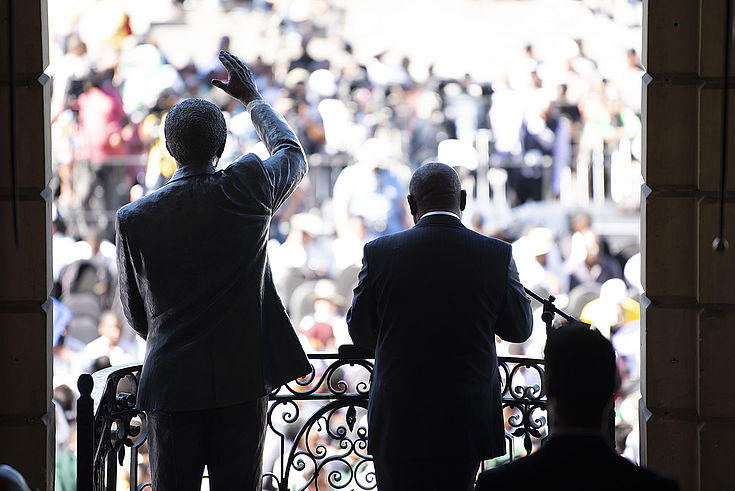
Madiba addressed the nation and the world from here, 11 Feb 1990 - an iconic leader, and a free man, after 27 years of incarceration by the Apartheid regime
DISTILLED PHOTOGRAPHY; NMF
For millions worldwide, Mandela’s release embodied the victory of the democratic forces in South Africa and the international anti-apartheid movement, whose increasingly successful boycott campaign brought the country's economy to its knees. Looking back at these years, it becomes clear that the end of the cold war had a significant impact on the events in South Africa as well. After the fall of the Berlin Wall in 1989 and the foreseeable "end of the Eastern Bloc" in Europe, international pressure on De Klerk's government to release the legendary freedom fighter and most famous prisoner in the world, and to end the system of Apartheid, a crime against humanity, also increased again. With his policy of reconciliation, Nelson Mandela, like no other, soon became a beacon of hope for a non-racial, democratic South Africa, and a better future for all who live in it - especially for black South Africans who had been oppressed for centuries.
Elected president in the first democratic elections in 1994, Nelson Mandela handed the baton over to his successor Thabo Mbeki, after just one term in power, and at his own request, with the 1999 elections. He continued to work tirelessly for poverty reduction, justice, development, improved education and reconciliation, in numerous initiatives both in South Africa and abroad, Nelson Mandela died in 2013 at the age of 95.
The Nelson Mandela Foundation, founded by the former President after his term of office, has been a partner institution of the Hanns Seidel Foundation for many years. It manages his extensive archive and compiles publications, organizes well-attended dialogue events and strategically facilitates specific projects in multi-sectoral cooperation between government, civil society and business, thereby supporting better policy making and implementation. In addition, there are the large “Annual Lectures” with leading international thinkers, activists and decision makers, which stimulate social discourse. In 2018, the year of Mandela’s 100th birthday, Barack Obama gave the lecture in Johannesburg.
When working on keeping Mandela's legacy alive, the foundation consistently follows a practical, critical approach: its founder should not be idealized and placed on a pedestal - which Mandela had often resisted himself. It is important for the Foundation to promote social dialogue on difficult issues, and to advance the realization of Madiba’s vision of justice.
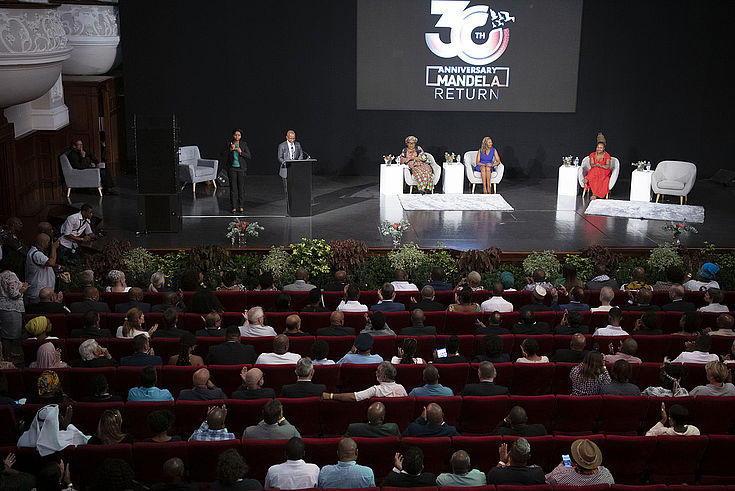
"The New Prisons of Africa" - A great speech, and a frank debate
DISTILLED PHOTOGRPAHY; NMF
On the occasion of the 30th anniversary of Nelson Mandela's release, a public panel discussion in Cape Town, "The New Prisons of Africa", critically reflected on how Madiba’s legacy is implemented. This was preceded by a powerful speech by Nobel Peace Prize laureate Leymah Gbowee from Liberia. The event with many hundreds of participants dealt with the topic of being trapped. It also recalled the situation in prisons, which are often in a pitiful state in South Africa, that all too often does not guarantee compliance with human rights much invoked by Nelson Mandela. In her speech, Leymah Gbowee spoke about the important values Nelson Mandela so consistenly embodied: service, compassion, humanity, sacrifice - and about the need to reignite them in our societies.
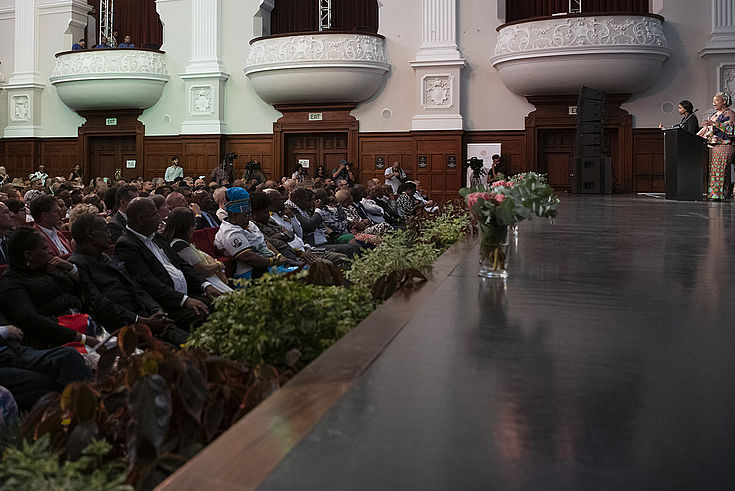
Cape Town City Hall - a receptive audience
DISTILLED PHOTOGRAPHY; NMF
Above all, however, the issue of being trapped in depressing living conditions of poverty and social injustice, which still affects the vast majority of the continent's population, was discussed. The speakers on the podium - all of them women - identified corruption, poor governance and the lack of ethical visions in institutions in many African countries as causes of hopelessness and persistent poverty, which should be tackled resolutely, in the spirit of Mandela. Opal Tometi, co-founder of #BlackLivesMatter, and Dr. Danai Mupotsa, South African literary scholar and author, also reflected on widespread individual and structural racism and its roots, and the need to confront it consistently and in diverse ways - a topic that is crucial far beyond South Africa, and unfortunately in Germany as well.
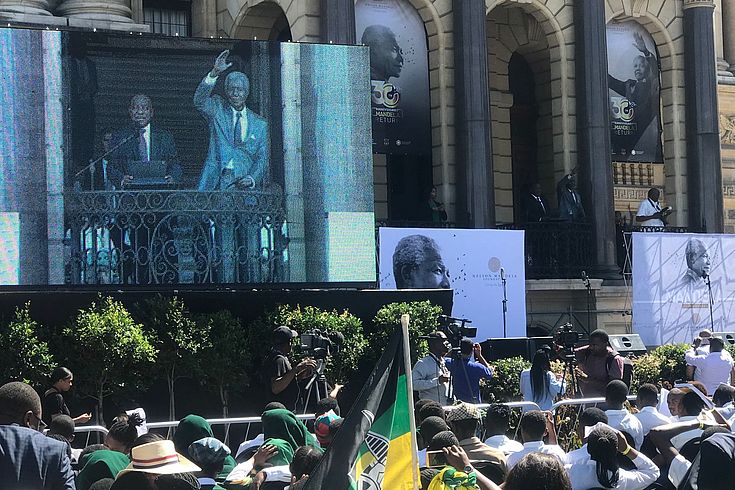
Impressions from the President's speech this week
HSF; HSF
Thirty years after his release, Nelson Mandela’s country finds itself on the brink of an abyss - economic crises are deepening, daily power cuts are worsening prospects, 30% of the population and more than 50% of youth are unemployed, and South Africa has the greatest social inequality in the world. The years of Jacob Zuma's presidency (2009-2018) undermined many of the advances of the early days of the "new South Africa". They saw a dangerous increase in immense, widespread corruption, in which international companies were also involved, a captured state and a dramatic decline in investment.
President Cyril Ramaphosa, who is widely regarded as a true democrat, experienced economist and reformer and has been in office since the beginning of 2018, has made some encouraging progress, especially when it comes to successful appointments at the top of important Institutions and certain SOEs. However, other ANC leaders accused of corruption and lack of competence also hinder the urgently needed structural reforms in the party and government.
President Cyril Ramaphosa gave a passionate speech on Tuesday afternoon - from the same historic balcony in Cape Town that Nelson Mandela spoke of on the day he was released. Mandela's speech at the time is sometimes described as the "birth of the nation". Upright, unbroken, but without any bitterness or revenge, he called for unity and restraint but also vigilance at the time to enable a new beginning for the country. The speech is considered to be groundbreaking for the years that followed, in which the real threat of civil war was averted and democratic elections and an internationally acclaimed constitution were adopted in tough multilateral negotiations.
On February 11, 1990, Ramaphosa, a respected young union leader at the time and member of the official reception committee, had stood right next to Mandela. Yesterday, he eloquently reminded us of this truly moving day, when the world had stood still and people in many countries cried with joy, and he described its historic background and consequences. He emphasized that Mandela, the "prisoner of a heartless regime", was released only because of the sustained, heroic resistance in the country, and the international pressure - not because De Klerk suddenly became moral.
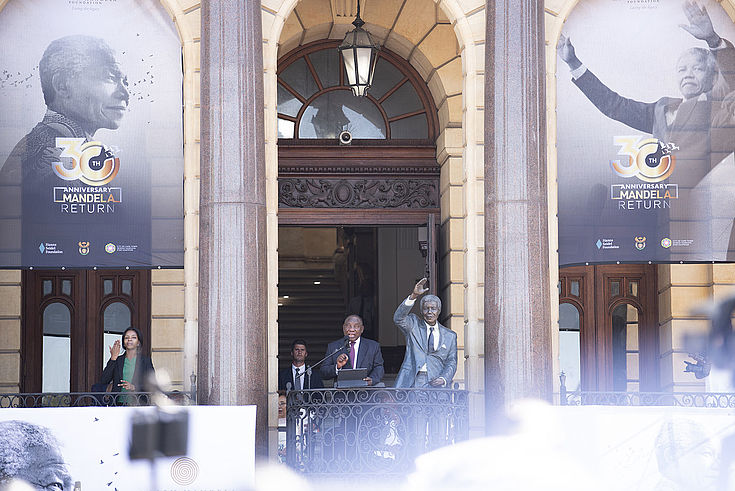
President Cyril Ramaphosa speaking from the historic balcony
DISTILLED PHOTOGRAPHY; NMF
At the same time, Ramaphosa, in his speech at this historic site, expressed his determination to do everything possible to implement Mandela’s legacy in his home country, against all odds. In almost unsparing criticism, he did speak out about the failures of recent years, named the deep crises in the country and warned that Mandela’s values urgently need to be revived. Ramaphosa stressed that rampant corruption, crime and social evils threatened to undermine progress: “The shameful murders of women and girls, the stench of corruption and the abuse of public funds have undermined our people’s trust, and threaten the achievements of democracy”. In this quest, he could not only count on the support of the South African population, civil society and large parts of the business sector - in recent surveys, he emerged by far the most popular politician, with 64% support. During her visit in early February, Angela Merkel also reassured him that Germany and Europe are by his side - and this was demonstrated by the signing of a series of bilateral agreements that promote sustainable development.
Millions in South Africa this week remembered the invigorating, hopeful times of Mandela's release, and the events marking the Anniversary found a broad, emotional echo in traditional and social media. However, the fact that the large Grand Parade square in Cape Town, which was overflowing with many thousands of people who had come to see Nelson Mandela speak in 1990, was far from filled on Tuesday for Ramaphosa’s speech, also may show that the population is increasingly becoming disillusioned.
South Africans hope that Ramaphosa and his allies will soon be able to achieve the much-needed progress with the necessary resolve and consistency, in order to put the country on a better path, and to keep the dream of Mandela and his heirs alive. Otherwise, the future of the next generations would be painfully endangered as well.
